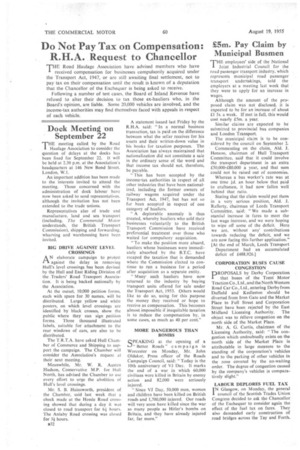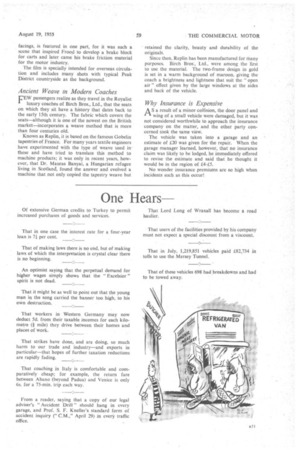Do Not Pay Tax on Compensation: R.H.A. Request to Chancellor
Page 65

Page 66

If you've noticed an error in this article please click here to report it so we can fix it.
THE Road Haulage Association have advised members who have received compensation for businesses compulsorily acquired under the Transport Act, 1947, or are still awaiting final settlement, not to pay tax on their compensation until the result is known of a deputation that the Chancellor of the Exchequer is being asked to receive.
Following a number of test cases, the Board of Inland Revenue have refused to alter their decision to tax those ex-hauliers who, in the Board's opinion, are liable: Some 20,000 Vehicles are involved, and the income-tax authorities may find themselves faced with appeals in respect of each vehicle.
Dock Meeting on September 22
THE meeting called, by the Road Haulage Association to consider the question of delays at the docks has been fixed for September 22. It will be held at 2.30 p.m. at the Association's headquarters at 146 New Bond Street, London, W.1.
An important addition has been made to the interests invited to attend the meeting. Those concerned with the administration of dock ' labour have now been asked to send representatives, although the invitation has not been extended to the trade unions.
Representatives also of trade and manufacture, land and sea transport (including, The Commercial Motor understands, the British Transport Commission), shipping and forwarding, wharving and warehousing have been invited.
BIG DRIVE AGAINST LEVEL CROSSINGS
AN elaborate campaign to protest against the delay in removing Hull's. level crossings has been devised by the Hull and East Riding Division of the .Traders' Road Transport Association. It is being backed nationally by the Association.
At the outset, 10,000 petition forms, each with space for 30 names, will be distributed. Large yellow and white posters, on which level crossings are identified by black crosses, show the public where they can sign petition forms.. Three thousand illustrated labels, suitable for attachment to the rear windows of cars, are also to be distributed.
The T.R.T.A, have asked Hull Chamber of Commerce and Shipping to support the campaign. The Chamber will consider the Association's request at their next meeting.
Meanwhile, Mr. W. R. Austen Hudson, Conservative ACP. for Hull North, has advised the Chamber to use every effort to urge the abolition of Hull's level crossings.
Mr. S.. B. Hainsworth, president of the Chamber, said last week that a check made at the Hessle Road crossing showed that during a day it was closed to road transport for 6 hours. The Anlaby Road crossing was chmed for 34 hours.
B32 A statement issued last-Friday by the R.H.A. said: "In a normal business transaction, tax is paid on the difference between what the seller receives for his assets and their written-down value in his books for •taxation purposes. The Association has always maintained that nationalization did not constitute a sale in the ordinary sense of the word and that income tax should not, therefore, be payable.
"This has been accepted by the income-tax authorities in respect of all other industries that have been national ized, including the former owners of railway wagons acquired under the
Transport Act, 1947, but has not so far been accepted in respect of one category of hauliers.
" A deplorable anomaly is thus created, whereby hauliers who sold their businesses voluntarily to the British Transport Commission have received preferential treatment over those who waited for compulsory acquisition.
"To make the position more absurd, hauliers whose businesses were immedi
ately absorbed by the B.T.C. have escaped the taxation that is demanded where the Commission elected to continue to run a business for a period after acquisition as a separate entity.
"Many such hauliers have now returned to the industry by buying transport units offered for sale under the Transport Act, 1953. Others would like to do so, using for this purpose the money they received or hope to receive as compensation. This becomes almost impossible if inequitable taxation is to reduce the compensation by, in some cases, as much as 40 per cent."
MORE DANGEROUS THAN BOTVIRS
PEAKING at the opening of a bj" Better Roads" campaign in Worcester on Monday, Mr. John Oldaker, Press officer of the Roads Campaign Council, said: "Today is the 10th anniversary of VI Day. It marks the end of a war in which 60.000 civilians were killed in Britain by enemy action and 82,000 were seriously injured.
"Since VJ Day, 50,000 men, women and children have been killed on British roads and 1,700,000 injured. Our roads will very soon have killed since the war as many people as Hitler's bombs on Britain, and they have already injured far, far more."
£5m. Pay Claim by Municipal Busmen
THE employees' side of the National Joint Industrial Council for the road passenger transport industry, which represents municipal road passenger transport undertakings, told the employers at a meeting last week that they were to apply for an increase in wages.
Although the amount of the proposed claim was not disclosed, it is expected to be for an increase of about £.1 5s a week. If met in full, this would cost nearly £5m. a year.
Similar claims are expected to be submitted to provincial bus companies and London Transport.
The municipal claim is to be considered by the council on September 2.
• Commenting on the claim, Ald. J. Henson, chairman of Hull Transport
Committee, said that it could involve the transport department in an extra f50,000-£80,000 a year, and that sum could not be raised out of economies.
Whereas a bus worker's rate was at one time id. an hour below that paid to craftsmen, it had now fallen well behind that ratio.
Stating that the claim would put them in a very serious position, Ald. J.
Rafferty, chairman of Leeds Transport
Committee, said: "We made a substantial increase in fares to meet the
last wage increase, and we were hoping to wipe off some of the deficit. Here we are, without any' contributions towards reducing the deficit, and we are now facing this further application." (At the end of March, Leeds Transport Department had an accumulated deficit of 1488,926.]
CORPORATION BUSES CAUSE CONGESTION PROPOSALS by Derby Corporation that buses of the Trent Motor. Traction Co.,Ltd., and the North Western Road Car Co., Ltd., entering Derby from Duffield and Kedleston should be diverted from Iron Gate and the Market Place to Full Street and Corporation Street have been rejected by the East Midland Licensing Authority. The object was to relieve congestion on the north side of the Market Place.
Mr. A. G. Curtis, chairman of the Licensing Authority, said: "The congestion which undoubtedly exists on the north side of the Market Place is attributable in large measure to the standing of the corporation's vehicles and to the parking of other vehicles in the zone covered by the no-waiting order. The degree of congestion caused by the company's vehicles is comparatively slight."
LABOUR DEPLORES FUEL TAX IN Glasgow, on Monday, the general 1 council of the Scottish Trades Union Congress.decided to ask the Chancellor of the Exchequer to consider again the effect of the fuel tax on fares. They also demanded early construction of road bridges across the Tay and Forth. facings, is featured in one part, for it was such a scene that inspired Frood to develop a brake block for carts and later came his brake friction material for the motor industry.
The film is specially intended for overseas circulation and includes many shots with typical Peak District countryside as the background.
Ancient Weave in Modern Coaches
F" passengers realize as they travel in the Royalist luxury coaches of Birch Bros., Ltd., that the seats on which they sit have a history that dates back to the early 15th century. The fabric which covers the seats—although it is one of the newest on the British market—incorporates a weave method that is more than four centuries old.
Known as Replin, it is based on the famous Gobelin tapestries of France. For many years textile engineers have experimented with the type of weave used in these and have tried to translate this method to machine products; it was only in recent years, however, that Dr. Mauras Banyai, a Hungarian refugee living in Scotland, found the answer and evolved a machine that not only copied the tapestry weave but retained the clarity, beauty and durability of the originals.
Since then, Replin has been manufactured for many purposes. Birch Bros., Ltd., were among the first to use the material. The two-frame design in gold is set in a warm background of maroon, giving the coach a brightness and lightness that suit the "open air" effect given by the large windows at the sides and back of the vehicle.
Why Insurance is Expensive
AS a result of a minor collision, the door panel and wing of a small vehicle were damaged, but it was not considered worthwhile to approach the insurance company on the matter, and the other party concerned took the same view.
The vehicle was taken into a garage and an estimate of £20 was given for the repair. When the garage manager learned, however, that no insurance claim was likely to be lodged, he immediately offered to revise the estimate and said that he thought it would be in the region of £4-£5.
No wonder insurance premiums are so high when incidents such as this occur!








































































































